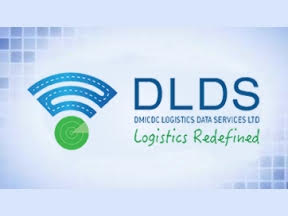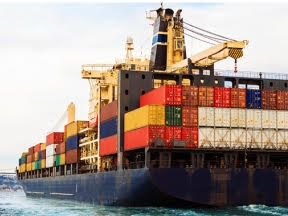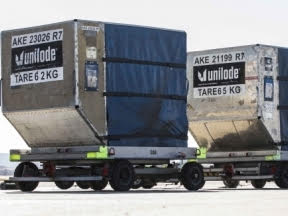Talking about what government has done or what can we expect from the government to do, Keku Bomi Gazder, CEO, AAICLAS stressed on how CBIC has enabled the faceless and paperless evaluation of our shipments. Considering the two portals that the Ministry of Civil Aviation has rolled out almost two years ago and how ICEDASH has improved the monitoring of customs clearance of imported goods, the government is faster than the private sector in digitisation. He believes, “It is more for us in the industry to keep up with the government rather than asking what the government can do.”
Read More »DLDS upgrades Logistics Data Bank portal with detailed end-to-end tracking
To enhance its customers’ experience and mitigate risks in the current challenging times, DMICDC Logistic Data Services (DLDS) has revamped Logistics Data Bank (LDB) portal. The redesigned LDB portal brings in a well-defined layout and navigation and delivers a visually pleasing platform to its customers. The portal now provides detailed voyage tracking of EXIM containers with end-to-end tracking map view. Earlier the information was provided only for next destination but now detailed information can be accessed about container port of loading and unloading. International location tracking plays a huge part in planning supply chain, and now imported containers can be tracked from the port of loading. Users can do multiple container tracking and group container tracking through a grid console to enable user-friendly engagement. “We did a lot of brainstorming to see how we could help shape the portal and information to better suit those who need it the most. LDB users can now see dwell time of containers at Ports, CFSs, ICDs on a real-time basis. We have also added the feature of gate cut off and expected vessel departure information to enable our customers to plan their daily operations efficiently,” said Surajit Sarkar, COO, DLDS. Speaking about the project update Mr. Ichiro Oshima, CEO DLDS said, “The new portal is designed to empower our customers to mitigate risks in the current challenging times. The interactive map with DPE/DPD and next delivery information will make it easier for users to plan and monitor their operations.”
Read More »DB Schenker introduces airfreight & contract logistics hub of 51,400 sq m in Singapore
DB Schenker has started operations at the Red Lion warehouse in Singapore, a regional hub for automated high-speed logistics. The warehouse worth is 101 million euros and is the single largest investment in any site globally in Schenker’s corporate history. Strategically located in the Airport Logistics Park of Singapore (ALPS) at Changi Airport, the site sets a new standard in combining the world’s most advanced technological developments with the highest levels of sustainable warehouse management for its customers. Jochen Thewes, Chief Executive Officer DB Schenker, says, “Our new logistics hub makes us even faster and more reliable for our customers. The record investment in Red Lion marks an unparalleled milestone for our corporate history of almost 150 years. We are happy and proud to reinforce our commitment to Singapore as the heart of our logistics operations in Asia.” Red Lion solidifies Schenker’s position in Singapore as the largest and most advanced third-party logistics provider in the ALPS. Combined, the mechanized air freight hub and contract logistics warehouse extend over 51,400 square meters on five floors, equal to the size of seven soccer fields. A next generation Warehouse Management System and a synchronized IT platform bridging the various automations enable Red Lion to increase warehouse productivity by up to 100% compared to manual processes, and to reduce lead time for customers by 40% compared to non-integrated facilities.
Read More »Ethiopian Cargo partners with RTS on cargo revenue management & pricing solutions
Ethiopian Cargo & Logistics Services has partnered with RTS on cargo revenue management (velocity) and pricing (AcceleRate) solutions. Fitsum Abady, MD, Ethiopian Cargo & Logistics Services states, “We are very optimistic that having Revenue Management and Pricing system will help us to maximise revenue by utilising the available capacity for high yield cargos. This revenue maximization would be achieved using an automated decision-making system that would be accurately forecasting cargo capacity by flight and a price range for evaluating pricing requests. It also helps allocate capacity to the appropriate products in such a way that maximizes profit. “ According to Mukundh Parthasarathy, Senior Vice President for Revenue Technology Services, “At the rate at which Ethiopian Cargo is growing, the solution would be instrumental in automating the revenue and pricing management.”
Read More »Retailers to evaluate fulfillment strategies to achieve web orders
86 per cent of APAC retailers looking to increase investment in intelligent automation by 2022, says, 12th Annual APAC Shoppers Study by Zebra Technologies. With the businesses reopening and rebuilding from the COVID-19 pandemic, the resiliency of retailers and supply chains are being tested more now than ever before. One monumental shift relates to the concept of ‘economy at home’, which addresses the way consumers have completely changed their shopping habits. To meet rising customer expectations, retailers need to rethink the safety of the customer journey, whether it is in store or via delivery. Click-and-collect, or buy online, pick-up in store (BOPIS), are becoming preferred methods of shopping, with 55% of consumers requesting more retailers to offer mobile ordering options. This is forcing businesses to rethink their fulfillment strategies given that only 36 per cent of respondents agreed that their stores are equipped to fulfil web orders. The study expects this trend to continue, while retailers implement additional solutions that minimize in-store contact and improve customer convenience at the same time. “COVID-19 has significantly altered the retail sector, forcing both essential and non-essential retailers to assess their Omni channel fulfilment capabilities and quickly adapt their operating models in a matter of days – some implementing changes within hours,” said Deep Agarwal, Regional Sales Director of India, Zebra Technologies. “We’re seeing how retailers are transforming ‘dark stores’ to serve as temporary distribution facilities inside their establishments. Retailers should prioritize the expansion of click-and-collect service offerings and invest in technologies that increase shopping capacity and speed. This reduces in-store traffic and aids in social distancing efforts, while providing retailers with inventory visibility across every corner of the shop floor.”
Read More »SoftLink partners with ODeX to offer EXIM trade seamless documentation and payments
In order to help EXIM trade work more efficiently, SoftLink Global and ODeX has announced a collaboration enabling custom brokers, freight forwarders and other logistics service providers to file VGM and Form 13 seamlessly. SoftLink is the platform for freight forwarders and custom brokers and ODeX provides a digital platform for documentation and payments for EXIM Trade. Integrating ODeX’s e-VGM and e-Form 13 modules with SoftLink’s Logisys saves critical time and effort spent in entering and submitting data in multiple systems. This integration will be effective over 200+ shipping lines and NVOCC’s that accept VGM and Form 13 on ODeX.
Read More »From the pages of CargoTalk: COVID-19 helps shifting focus from document to data: Amar More
“Over the last half-a-decade, digitisation has been the buzzword in air cargo industry, says, Amar More, CEO, Kale Logistics Solutions, in adding, “It has been the key topic of every conference or seminar. The most common term used during these conferences was ‘dinosaur’: are we a dinosaur in a digital world?” Calling COVID-19 an accelerator for giving a boost to digitisation, More explains, “It is true that compared to other sectors like automobile, banking and even travel; air cargo has been lagging behind in terms of digitalisation, despite the integrators and the increase of e-commerce. But now we have witnessed that there is a surge in the Cloud-based solutions and platforms. The focus is shifting from documents to data. The infrastructure is there, innovative technology is ready, it’s just a matter of time before we move to data and automate.”
Read More »Holisol launches ‘Verdis Visibility’ for higher level of supply chain performance
Holisol Logistics has launched ‘Verdis Visibility’ to provide complete end-to-end visibility of supply chain processes in terms of the key parameters relevant to the organisation. Verdis Visibility is a part of company’s AI and ML-driven supply chain solutions system. The integrated flow of material and information is captured and easily available in the ‘dashboards’ of Verdis Visibility, in real-time, automated and online manner, enabling monitoring, analysis and quick decision making in the complex supply chains of today. “Verdis takes a deep dive into the organisation’s wide data (structured & unstructured) to connect the variables and identify a pattern to build the opportunity intelligence to realise its full potential,” says Rahul S Dogar, Co-Founder & Managing Director of Holisol Logistics.
Read More »Unilode partners with dnata to equip its warehouses with Bluetooth readers
In order to enhance the efficiency of ULD operations in the global network of their customers, Unilode Aviation Solutions and dnata have signed an agreement to equip all dnata warehouses with Unilode’s Bluetooth readers. Unilode’s digital solution transmits data on the geolocation of the ULDs and can also share other relevant information such as temperature, humidity, shock and light, using ULDs equipped with Bluetooth digital tags and a network of bluetooth readers and mobile devices. Benoit Dumont, CEO, Unilode, said, “Unilode is currently digitising its entire ULD fleet of 140,000 units with tags and is rolling out a bluetooth reader network infrastructure in over 250 locations worldwide. Our new agreement with dnata will help us accelerate the creation of Unilode’s digital ecosystem and enable us to increase ULD visibility, data accuracy and asset stock control, in addition to providing our customers with important information on their cargo.”
Read More »From the pages of CargoTalk: People with strong digital backbone counter better to this crisis: Ashok Rajan
“Supply has never been a problem in the cargo industry before this pandemic,” says Ashok Rajan, Senior Vice President and Head – Cargo & Logistics Solutions, IBS Software. Calling digitisation a saving grace for most of the air cargo professionals, Rajan shares, “In last three months, nature of operations has started to change considerably. With the work from home concept, interactions have gone digital. People who had strong digital backbone have responded much better to this crisis.” “In the time of crisis people are struggling to get connected to their customers in order to make sales. Hence, people who had access to digital sale channel are actually able to get a bigger chunk of the market than others,” he adds.
Read More » Cargo Breaking News
Cargo Breaking News









